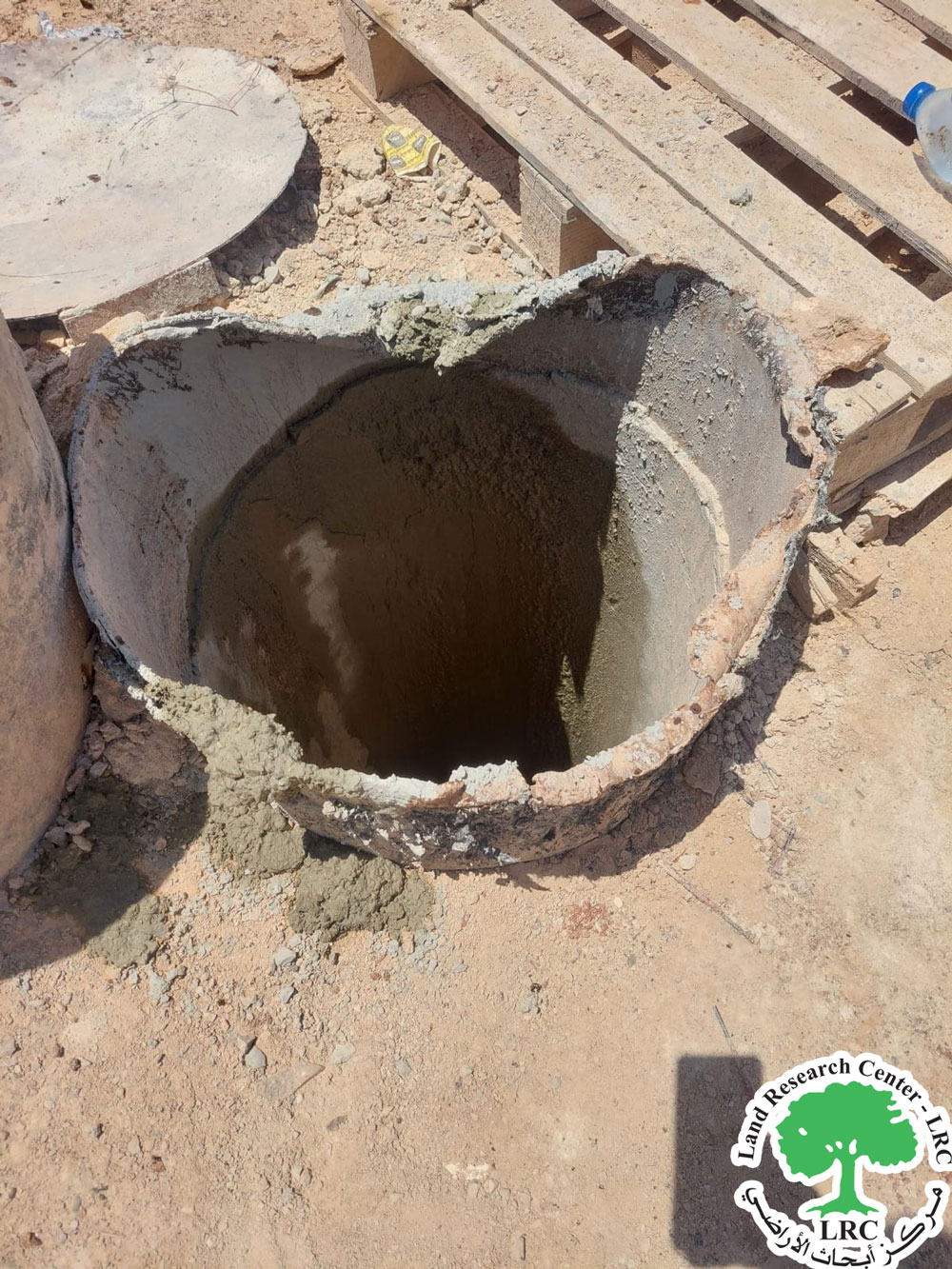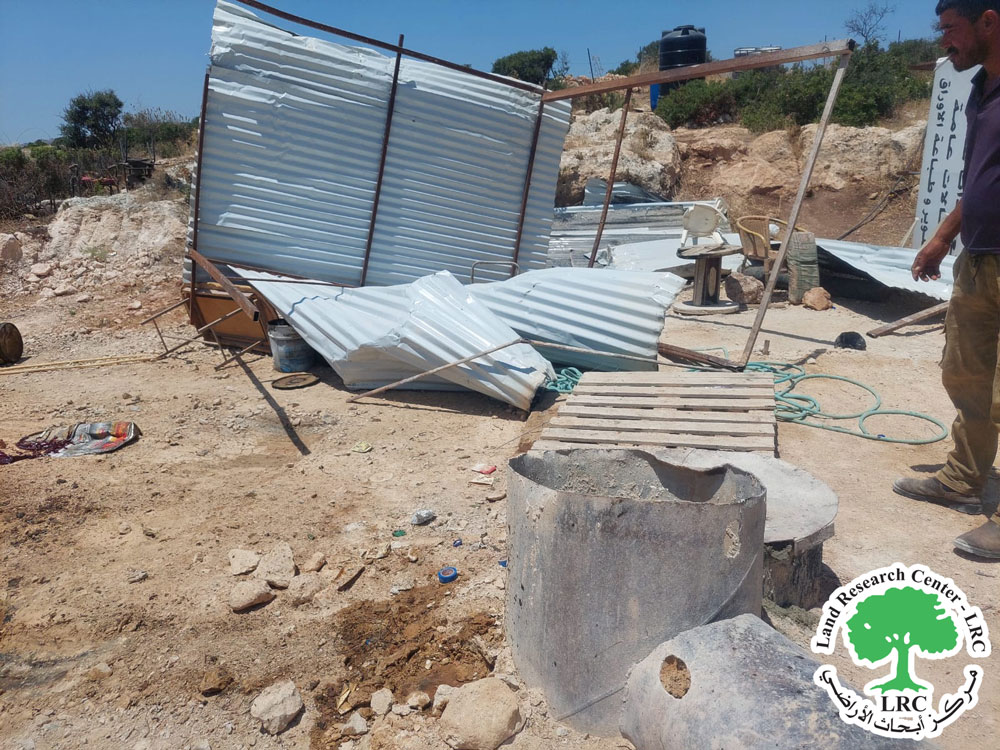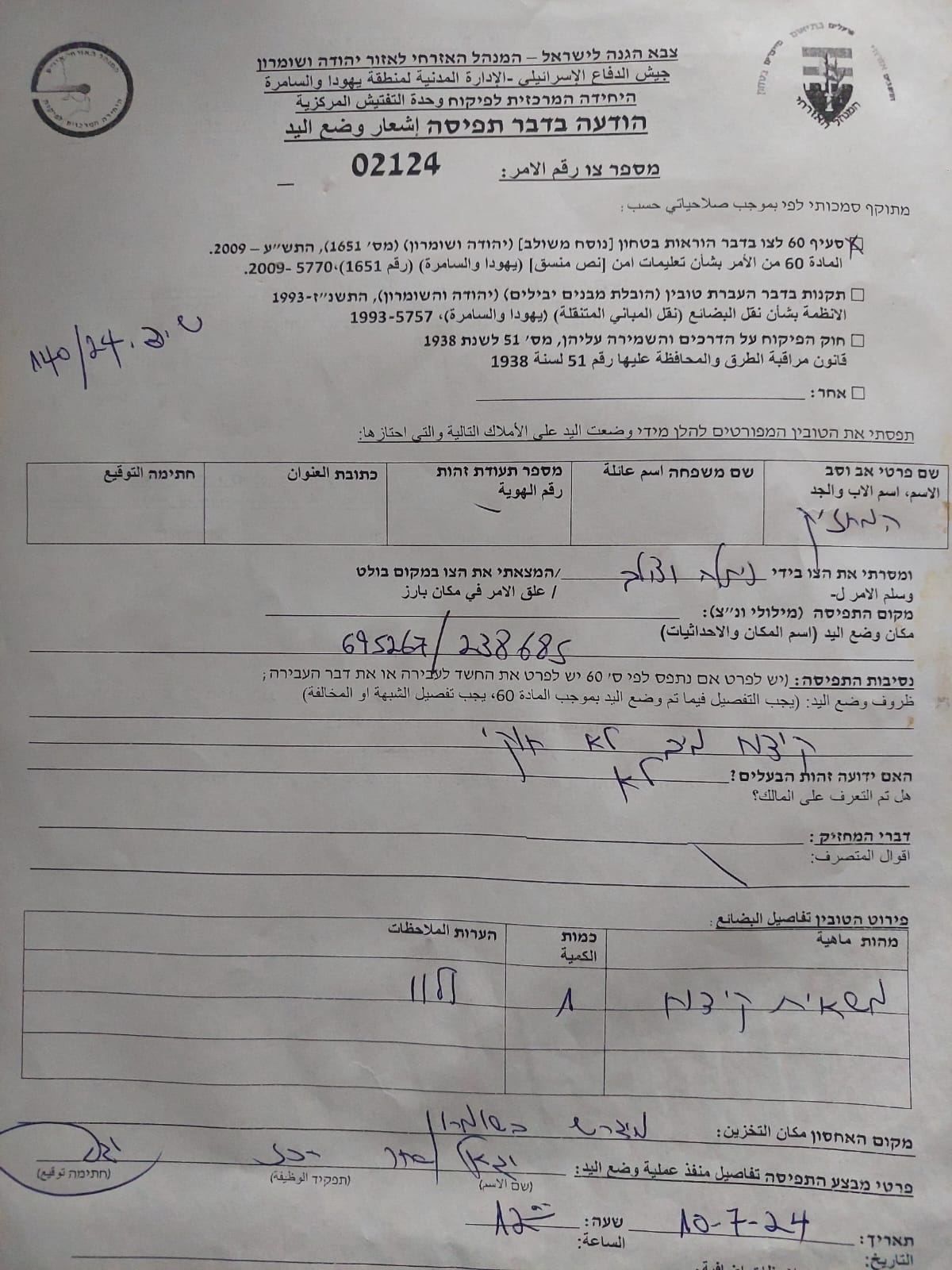2024-07-11
الاحتلال يردم بئر ارتوازي في قرية العقبة / محافظة طوباس
- الانتهاك: تدمير بئر ارتوازي.
- الموقع: قرية العقبة / محافظة طوباس.
- تاريخ الانتهاك: 11/07/2024.
- الجهة المعتدية: جيش الاحتلال الإسرائيلي.
- الجهة المتضررة: المزارع سليمان أحمد خضيرات.
تفاصيل الانتهاك:
قامت قوة كبيرة من جيش الاحتلال الإسرائيلي بمداهمة قرية العقبة بمحافظة طوباس، ووصلت الى منطقة " المخبة" الواقعة شمال القرية، وقامت بردم بئر مياه ارتوازي قيد الإنشاء، يقع في تلك المنطقة، وتعود في ملكيته للمزارع سليمان أحمد خضيرات.
يشار الى أن سلطات الاحتلال قامت بمصادرة الحفار المائي ( حفار يستخدم لحفر الآبار) ومصادرة مضخة المياه منه التي كانت تعمل في الموقع، كما قامت بردم فوهة البئر لمنع المزارع من استخراج المياه لأغراض زراعية.
يذكر أن المزارع سليمان أحمد خضيرات معيل لأسرة مكونة من (13) فرداً من بينهم (4) إناث و (5) أطفال ضمن العائلة.
آثار تخريب بئر المياه الارتوازي
محضر مصادرة والاستيلاء على الحفار ( المقدح المائي)
وبحسب إفادة المزارع خضيرات لباحث مركز أبحاث الأراضي بالتالي:
"إن البئر الذي لا يزال في مرحلة الإنشاء؛ تم حفره بعمق 80 مترا وكان من المقرر أن يخدم ويروي ما لا يقل عن 60 دونماً من الأراضي المزروعة بالزراعات المروية بالإضافة الى توفير مياه الشرب لرؤوس الأغنام التابعة لمربي الماشية، حيث أن المزارعين كانوا سابقاً يقومون بشراء المياه بسعر (150 شيقل) للصهريج الواحد والذي يحوي على أربعة متر مكعب للمياه، وهذا مكلف جداً ومرهق للمزارعين، وكان إنشاء البئر يهدف الى تقليل العناء ويوفر المياه لهم بسعر رمزي ولكن الاحتلال دمر كل شيء".
يشار الى أن قرية العقبة كباقي التجمعات الغورية تعاني من شح كبير في المياه وهذا سبب بأزمة كبيرة طالت انخفاض ملموس في عدد روؤس الأغنام التي يقتنيها أصحاب التجمعات البدوية، حيث يفرض الاحتلال قيود تمنع استغلال الموارد المائية بينما يسهل على المستعمرين السيطرة عليها واستغلالها بشكل كبير.
يشار إلى أن نموذج قرية العقبة، ينطبق على الكثير من غيرها من البلدات الفلسطينية، فالإحصائيات تشير إلى أنه يوجد في محافظة نابلس لوحدها 27 قرية فلسطينية دون شبكات مياه، هذا في وقت تستولي إسرائيل على عيون المياه والآبار الارتوازية، حيث أن المستعمرين في الضفة الغربية يستهلكون خمسة أضعاف ما يستهلكه المواطن الفلسطيني من المياه.
كما أنه حسب تقرير صدر مؤخراً عن المجلس الاقتصادي الفلسطيني للتنمية والإعمار ‘بكدار’ فان معدل استهلاك المواطن الفلسطيني من المياه في الضفة الغربية ولكافة الأغراض المنزلية والزراعية يقدر بحوالي 130 متراً مكعباً في السنة، إلا أن المواطن الإسرائيلي يستهلك 2235 متراً مكعباً في السنة.
استهداف آبار المياه يعد انتهاكاً صارخاً بحق البيئة الفلسطينية:
إن استهداف الآبار وخزانات المياه والبرك أدى الى زيادة نسبة الجفاف والتصحر في الأراضي الزراعية وبالتالي اتلافها بالكامل، حيث أن سياسة الاحتلال في منع بناء الآبار وتدميرها سياسة ممنهجة يتبعها جيش الاحتلال ومستعمروه كما أنهم يلاحقون عيون المياه ويلوثنها أو يقومون بالاستيلاء عليها كما عين الساكوت وعين حلوة في طوباس وغيرها من المناطق الأخرى.
هذا وبحسب فريق البحث الميداني في مركز أبحاث الأراضي فإنه تم توثيق خلال النصف الأول من عام 2024 هدم جيش الاحتلال لـ 32 بئر وخزان مياه وبئر ارتوازي بحجم 463م3، وتدمير خطي مياه بطول 1400م، وكانت تروي الآبار 550 دونماً زراعياً تم اتلاف الزراعة نتيجة فقدانها مصدر الري.
هذا وتصاعدت اعتداءات المستعمرين بحق مصادر المياه الفلسطينية ، وبحسب مركز أبحاث الأراضي فإن المستعمرون دمروا وهدموا / أو لوثوا /سرقوا (10 آبار مياه، و66 خزان مياه، و 8 صهاريج مياه، ومصادرة 10 مضخات مياه، 6 شبكات مياه بطول 770م، 7 ينابيع مياه).
نبذة عن قرية العقبة:
تقع قرية العقبة على بعد 6كم شرق مدينة طوباس ضمن حدود محافظة طوباس، حيث تقدر مساحة مسطح البناء لها 40 دونماً وهي تعتبر جزءاً من قرية تياسير، وبلغ عدد سكانها حسب إحصائيات الجهاز المركزي للإحصاء عام 2007 (104) نسمة، وصودرت من أراضيها مساحة 332 دونماً لصالح معسكرات الاحتلال.
مشروع: حماية الحقوق البيئية الفلسطينية في مناطق "ج" SPERAC IV - FCDO
Disclaimer: The views and opinions expressed in this report are those of Land Research Center and do not necessarily reflect the views or positions of the project donor; the Norwegian Refugee Council.
إخلاء المسؤولية: الآراء ووجهات النظر الواردة في هذا التقرير هي آراء ووجهات نظر مركز أبحاث الأراضي ولا تعكس بالضرورة وجهات نظر أو مواقف الجهة المانحة للمشروع؛ المجلس النرويجي. للاجئين



